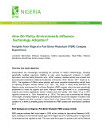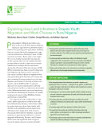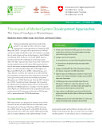Navigating Nigeria’s food system challenges in the face of inflation and reform
About this ebook
Low-income households in both urban and rural areas are hardest hit by rising food prices. Post-reform (fuel subsidies removal and exchange rate liberalization) price shocks and persistent inflation have disproportionately affected poor urban and rural households, forcing them to reduce food consumption and dietary diversity. Malnutrition and food insecurity are on the rise, particularly among children and women-headed households, with sharpest impacts in conflict-affected areas.
Small-scale farmers are not benefiting proportionately from price increases. Despite surging food prices, small-scale farmers face escalating input costs, poor market access, and structural in-efficiencies that leave them with marginal gains far below the rate of inflation.
Trading networks maintain healthy margins, amplifying systemic inefficiencies. Traders and intermediaries dominate the food supply chain, passing on increased costs to consumers while pre-serving or even increasing their profit margins, highlighting inequities in the distribution of benefits along the value chain.
Recent economic reforms and external shocks exacerbate structural weaknesses. Economic reforms, including the removal of fuel subsidies and exchange rate adjustments, have amplified existing challenges in the food system, including high transport costs, inadequate infrastructure, and fragmented markets.
Policy interventions should protect vulnerable groups and strengthen local food systems. Addressing these disparities requires targeted safety nets for consumers, support for small-scale farmers, and systemic investments to reduce inefficiencies in the value chain while promoting cli-mate-resilient food systems.




